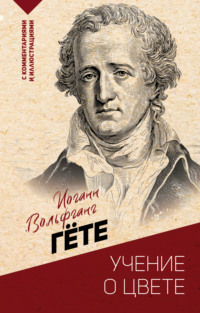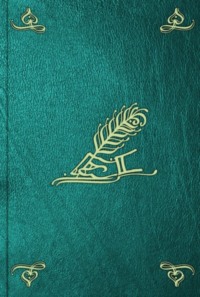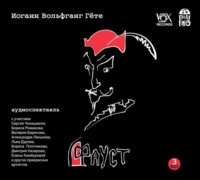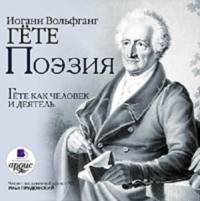 полная версия
полная версияLetters from Switzerland and Travels in Italy
Scenes of this kind may be witnessed without end. Thus fares it every day; always something new – some fresh absurdity. The variety of costume, too, that meets you in the streets; the multitude, too, of passages in the Toledo street alone!
Thus there is plenty of most original entertainment, if only one will live with the people; it is so natural, that one almost becomes natural oneself. For this is the original birth-place of Pulcinello, the true national mask – the Harlequin of Pergamo, and the Hanswurth of the Tyrol. This Pulcinello now is a thoroughly easy, sedate, somewhat indifferent, perhaps lazy, and yet humorous fellow. And so one meets everywhere with a "Kellner" and a "Hausknecht." With ours I had special fun yesterday, and yet there was nothing more than my sending him to fetch some paper and pens. A half misunderstanding, a little loitering, good humour and roguery, produced a most amusing scene, which might be very successfully brought out on any stage.
Naples, Tuesday, March 20, 1787.
The news that an eruption of lava had just commenced, which, taking the direction of Ottajano, was invisible at Naples, tempted me to visit Vesuvius for the third time. Scarcely had I jumped out of my cabriolet (zweirädrigen einpferdigen Fuhrwerk), at the foot of the mountain, when immediately appeared the two guides who had accompanied us on our previous ascent. I had no wish to do without either, but took one out of gratitude and custom, the other for reliance on his judgment, – and the two for the greater convenience. Having ascended the summit, the older guide remained with our cloaks and refreshment, while the younger followed me, and we boldly went straight towards a dense volume of smoke, which broke forth from the bottom of the funnel; then we quickly went downwards by the side of it, till at last, under the clear heaven, we distinctly saw the lava emitted from the rolling clouds of smoke.
We may hear an object spoken of a thousand times, but its peculiar features will never be caught till we see it with our own eyes. The stream of lava was small, not broader perhaps than ten feet, but the way in which it flowed down a gentle and tolerably smooth plain was remarkable. As it flowed along, it cooled both on the sides and on the surface, so that it formed a sort of canal, the bed of which was continually raised in consequence of the molten mass congealing oven beneath the fiery stream, which, with uniform action, precipitated right and left the scoria which were floating on its surface. In this way a regular dam was at length thrown up, in which the glowing stream flowed on as quietly as any mill-stream. We passed along the tolerably high dam, while the scoria rolled regularly off the sides at our feet. Some cracks in the canal afforded opportunity of looking at the living stream from below, and as it rushed onwards, we observed it from above.
A very bright sun made the glowing lava look dull; but a moderate steam rose from it into the pure air. I felt a great desire to go nearer to the point where it broke out from the mountain; there my guide averred, it at once formed vaults and roofs above itself, on which he had often stood. To see and experience this phenomenon, we again ascended the hill, in order to come from behind to this point. Fortunately at this moment the place was cleared by a pretty strong wind, but not entirely, for all round it the smoke eddied from a thousand crannies; and now at last we stood on the top of the solid roof, (which looked like a hardened mass of twisted dough), but which, however, projected so far outwards, that it was impossible to see the welling lava.
We ventured about twenty steps further, but the ground on which we stepped became hotter and hotter, while around us rolled an oppressive steam, which obscured and hid the sun; the guide, who was a few steps in advance of me, presently turned back, and seizing hold of me, hurried out of this Stygian exhalation.
After we had refreshed our eyes with the clear prospect, and washed our gums and throat with wine, we went round again to notice any other peculiarities which might characterise this peak of hell, thus rearing itself in the midst of a Paradise. I again observed attentively some chasms, in appearance like so many Vulcanic forges, which emitted no smoke, but continually shot out a steam of hot glowing air. They were all tapestried, as it were, with a kind of stalactite, which covered the funnel to the top, with its knobs and chintz-like variation of colours. In consequence of the irregularity of the forges, I found many specimens of this sublimation hanging within reach, so that, with our staves and a little contrivance, we were able to hack off a few, and to secure them. I saw in the shops of the dealers in lava similar specimens, labelled simply "Lava;" and I was delighted to have discovered that it was volcanic soot precipitated from the hot vapour, and distinctly exhibiting the sublimated mineral particles which it contained.
The most glorious of sunsets, a heavenly evening, refreshed me on my return; still I felt how all great contrasts confound the mind and senses. From the terrible to the beautiful – from the beautiful to the terrible; each destroys the other, and produces a feeling of indifference. Assuredly, the Neapolitan would be quite a different creature, did he not feel himself thus hemmed in between Elysium and Tartarus.
Naples, March 22, 1787.
Were I not impelled by the German spirit, and desire to learn and to do rather than to enjoy, I should tarry a little longer in this school of a light-hearted and happy life, and try to profit by it still more. Here it is enough for contentment, if a man has ever so little an income. The situation of the city, the mildness of the climate, can never be sufficiently extolled; but it is almost exclusively to these that the stranger is referred.
Naples-Sir William Hamilton
No doubt, one who has abundance of time, tact, and means, might remain here for a long time, with profit to himself. Thus Sir William Hamilton has contrived highly to enjoy a long residence in this city, and now, in the evening of his life, is reaping the fruits of it. The rooms which he has had furnished in the English style, are most delightful, and the view from the corner room, perhaps, unique. Below you is the sea, with a view of Capri, Posilippo on the right, with the promenade of Villa Real between you and the grotto; on the left an ancient building belonging to the Jesuits, and beyond it the coast stretching from Sorrento to Cape Minerva. Another prospect equal to this is scarcely to be found in Europe, – at least, not in the centre of a great and populous city.
Hamilton is a person of universal taste, and after having wandered through the whole realm of creation, has found rest at last in a most beautiful wife, a masterpiece of the great artist – Nature.
And now after all this, and a hundred-fold more of enjoyment, the sirens from over the sea are beckoning me; and if the wind is favorable, I shall start at the same time with this letter, – it for the north, I for the south. The human mind will not be confined to any limits – I especially require breadth and extent in an eminent degree; however, I must content myself on this occasion with, a rapid survey, and must not think of a long fixed look. If by hearing and thinking, I can only attain to as much of any object as a finger's tip, I shall be able to make out the whole hand.
Singularly enough, within these few days, a friend has spoken to me of Wilhelm Meister, and urged me to continue it. In this climate, I don't think it possible; however, something of the air of this heaven may, perhaps, be imparted to the closing books. May my existence only unfold itself sufficiently to lengthen the stem, and to produce richer and finer flowers; certainly it were better for me never to have come here at all, than to go away unregenerated.
Naples, March 22, 1787.
Yesterday we saw a picture of Correggio's, which is for sale. It is not, indeed, in very good preservation; however, it still retains the happiest stamp possible of all the peculiar charms of this painter. It represents a Madonna, with the infant, hesitating between the breast and some pears which an angel is offering it; the subject, therefore, is the weaning of Christ. To me the idea appears extremely tender; the composition easy and natural, and happily and charmingly executed. It immediately reminded me of the Vow of S. Catherine, and, in my opinion, the painting is unquestionably from the hand of Correggio.
Naples, Friday, March 23, 1787.
The terms of my engagement with Kniep are now settled, and it has commenced in a right practical way. We went together to Pæstuin, where, and also on our journey thither and back, he showed the greatest industry with his pencil. He has taken some of the most glorious outlines possible. He seems to relish this moving but busy sort of life, which has called for a talent which he was scarcely conscious of. This comes of being resolute: but it is exactly here that his accurate and nice skill shows itself. He never stops to surround the paper on which he is about to draw with the usual rectangular lines; however, he seems to take as much pleasure in cutting points to his pencil, which is of the best English lead, as in drawing itself. Thus his outlines are just what one would wish them to be.
Naples – A sketching excursion
Now we have come to the following arrangement: – From this clay forward, we are to live and travel together; while he is to have nothing to trouble himself about but drawing, as he has done for the last few days.
All the sketches are to be mine; but in order to a further profit, after our return, from our connexion, he is to finish for a certain sum a number of them, which I am to select; and then, remuneration for the others is to be settled according to the dexterity he evinces in them, and the importance of the views taken, and other considerations. This arrangement has made me quite happy, and now at last I can give you an account of our journey.
Sitting in a light two-wheeled carriage, and driving in turn, with a rough good-natured boy behind, we rolled through the glorious country, which Kniep greeted with a true artistic eye. We now reached the mountain stream, which, running along a smooth artificial channel, skirts most delightful rocks and woods. At last, in the district of Alla Cava, Kniep could not contain himself, but set to work to fix on paper a splendid mountain, which right before us stood out boldly against the blue sky, and with a clever and characteristic touch drew the outlines of the summit, with the sides also, down to its very base. We both made merry with it, as the earnest of our contract.
A similar sketch was taken in the evening from the window, of a singularly lovely and rich country, which passes all my powers of description. Who would not have been disposed to study at such a spot, in those bright times, when a high school of art was flourishing? Very early in the morning we set off by an untrodden path, coming occasionally on marshy spots towards two beautifully shaped hills. We crossed brooks and pools, where the wild bulls, like hippopotamuses, were wallowing, and looking upon us with their wild red eyes.
The country grew flatter and more desolate; the scarcity of the buildings bespoke a sparing cultivation. At last, when we were doubting whether we were passing through rocks or ruins, some great oblong masses enabled us to distinguish the remains of temples and other monuments of a once splendid city. Kniep, who had already sketched on the way the two picturesque limestone hills, suddenly stopped to find a spot from which to seize and exhibit the peculiarity of this most unpicturesque region.
A countryman, whom I took for my guide, led me the meanwhile through the buildings. The first sight of them excited nothing but astonishment. I found myself in a perfectly strange world; for, as centuries pass from the severe to the pleasing, they form man's taste at the same time – indeed, create him after the same law. But now our eyes, and through them our whole inner being, has been used to, and decidedly prepossessed in favor of, a lighter style of architecture; so that these crowded masses of stumpy conical pillars appear heavy, not to say frightful. But I soon recollected myself, called to mind the history of art, thought of the times when the spirit of the age was in unison with this style of architecture, and realised the severe style of sculpture; and in less than an hour found myself reconciled to it, – nay, I went so far as to thank my genius for permitting me to see with my own eyes such well-preserved remains, since drawings give us no true idea of them; for, in architectural sketches, they seem more elegant, and in perspective views even more stumpy than they actually are. It is only by going round them, and passing through them, that you can impart to them their real character; you evoke for them, not to say infuse into them, the very feeling which the architect had in contemplation. And thus I spent the whole day, Kneip the while working away most diligently in taking very accurate sketches. How delighted was I to be exempt from that care, and yet to acquire such unfailing tokens for the aid of memory! Unfortunately, there was no accommodation for spending the night here. We returned to Sorrento, and started early next morning for Naples. Vesuvius, seen from the back, is a rich country; poplars, with their colossal pyramids, on the road-side, in the foreground; these, too, formed an agreeable feature, which we halted a moment to take.
We now reached an eminence. The most extensive area in the world opened before us. Naples, in all its splendour: its mile-long line of houses on the flat shore of the bay, the promontories, tongues of land and walls of rock; then the islands, and, behind all, the sea, – the whole was a ravishing sight.
A most hideous singing, or rather exulting cry and howl of joy, from the boy behind, frightened and disturbed us. Somewhat angrily, I called out to him; he had never had any harsh words from us, – he had been a very good boy.
For a while he did not move; then he patted me lightly on the shoulder, and pushing between us both his right arm, with the fore-finger stretched out, exclaimed, "Signor, perdonate! questa è la mia patria!" – which, being interpreted, runs, "Forgive me, Sir, for that is my native land!" And so I was ravished a second time. Something like a tear stood in the eyes of the phlegmatic child of the north.
Naples, March 25, 1787.
Although I saw that Kniep was delighted to go with me to the festival of the Annunciation, still I could not fail to observe that there was a something he was sorry to part from. His candour could not let him long conceal from me the fact, that he had formed here a close and faithful attachment. It was a pretty tale to listen to, the story of their first meeting, and the description of the fair one's behaviour up to this time told in her favour; Kniep, moreover, insisted on my going and seeing for myself how pretty she really was. Accordingly, an opportunity was contrived, and so as to afford me the enjoyment of one of the most agreeable views over Naples. He took me to the flat roof of a house, which commanded a survey of the lower town, near the Mole, the bay, and the shore of Sorrento; all that lay beyond on the left, became fore-shortened in the strangest way possible, and which, except from this particular spot, was never witnessed. Naples is, every where, beautiful and glorious.
Naples – An apparition
While we were admiring the country around, suddenly, (although expected), a very beautiful face presented itself above the roof – for the entrance to these flat roofs is generally an oblong opening in the roof, which can be covered, when not used, by a trap-door. While, then, the little angel appeared in full figure above the opening, it occurred to me that ancient painters usually represent the Annunciation by making the angel ascend by a similar trap-door. But the angel on this occasion was really of a very fine form, of a very pretty face, and a good natural carriage. It was a real joy to me, under the free heaven, and in presence of the finest prospect in the world, to see my new friend so happy. After her departure, he confessed to me that he had hitherto voluntarily endured poverty, as by that means he had enjoyed her love; and at the same time, had learned to appreciate her contented disposition: and now his better prospects, and improved condition, were chiefly prized, because they procured him the means of making her days more comfortable.
Naples, March 25, 1787.
After this pleasant little incident I walked on the shore, calm and happy. There a good insight into botanical matters opened on me. Tell Herder that I am very near finding the primal vegetable type; only I fear that no one will be able to trace in it the rest of the vegetable kingdom. My famous theory of the Cotyledons is so refined, that perhaps it is impossible to go further with it.
Naples, March 26, 1787.
To-morrow this letter will leave this for you. On Thursday, the 29th, I go to Palermo in the corvette, which formerly, in my ignorance of sea matters, I promoted to the rank of a frigate. The doubt whether I should go or remain made me unsettled even in the use of my stay here; now I have made up my mind, things go on better. For my mental state this journey is salutary – indeed necessary. I see Sicily pointing to Africa, and to Asia, and to the wonderful, whither so many rays of the world's history are directed: even to stand still is no trifle!
I have treated Naples quite in its own style. I have been anything but industrious. And yet I have seen a great deal, and formed a pretty general idea of the land, its inhabitants, and condition. On my return there is much that I shall have to go over again; indeed, only "go over," for by the 29th of June I must be in Rome again. As I have missed the Holy Week, I must not fail to be present at the festivities of St. Peter's Day. My Sicilian expedition must not altogether draw me off from my original plans.
The day before yesterday we had a violent storm, with thunder, lightning, and rain. Now it is again clear; a glorious Tramontane is blowing; if it lasts, we shall have a rapid passage.
Yesterday I went with my fellow-traveller to see the vessel, and to take our cabin. A sea voyage is utterly out of the pale of my ideas; this short trip, which will probably be a mere coasting one, will help my imagination, and enlarge my world. The captain is a young lively fellow; the ship trim and clean, built in America, and a good sailer.
Naples-Departure for Sicily
Here every spot begins to look green; Sicily, they tell me, I shall find still more so. By the time you get this letter I shall be on my return, leaving Trinacria behind me. Such is man; he is always either anticipating or recalling; I have not yet been there; and yet I now am, in thought, back again with you! However, for the confusion of this letter I am not to blame. Every moment I am interrupted, and yet I would, if possible, fill this sheet to the very corner.
Just now I have had a visit from a Marchese Berio, a young man who appears to be well informed. He was anxious to make the acquaintance of the author of "Werther." Generally, indeed, the people here evince a great desire for, and delight in, learning and accomplishments. Only they are too happy to go the right way to acquire them. Had I more time, I would willingly devote it to observing the Neapolitans. These four weeks – what are they, compared with the endless variety of life?
Now, fare you well. On these travels I have learnt one thing at least – how to travel well; whether I am learning to live, I know not. The men who pretend to understand that art, are, in nature and manner, too widely different from me, for setting up any claim to such a talent.
Farewell, and love me as sincerely as I from my heart remember you.
Naples, March 28, 1787.
These few days have been entirely passed in packing and leave-taking; with making all necessary arrangements, and paying bills; looking for missing articles, and with preparations of all kinds. I set the time down as lost.
The Prince of Walbeck has, just at my departure, unsettled me again. For he has been talking of nothing less than that I should arrange, on my return, to go with him to Greece and Dalmatia. When one enters once into the world, and gives way to it, it is necessary to be very cautious, lest one should be carried away, not to say driven mad by it. I am utterly incapable of adding another syllable.
Naples, March 29, 1787.
For some days the weather has been very unsettled; to-day, (the appointed time for our sailing), it is again as fine as possible. A favourable north wind, a bright sunny sky, beneath which one wishes oneself in the wide world! Now I bid an affectionate farewell to all my friends in Weimar and Gotha. Your love accompanies me; for wherever I am I feel my need of you. Last night I dreamt I was again among old familiar faces. It seems as if I could not unload my boat of pheasants' feathers any where but among you. May it be well loaded.
SICILY
At Sea, Thursday, March 29, 1787.
A fresh and favourable breeze from the north-east is not blowing this time, as it did at the last sailing of the packet. But, unfortunately, a direct head-wind comes from the opposite quarter, the south-west – and so we are experiencing to our cost how much the traveller by sea depends upon the caprice of the wind and weather. Out of all patience, we whiled away the morning either on the shore or in the coffee-house; at last, at noon we went on board, and the weather being extremely fine, we enjoyed the most glorious of views. The corvette lay at anchor near to the Mole. With an unclouded sun the atmosphere was hazy, giving to the rocky walls of Sorrento, which were in the shade, a tint of most beautiful blue. Naples, with its living multitudes, lay in the full sunshine, and glittered brilliantly with countless tints. It was not until sunset that the vessel began slowly to move from her moorings; then the wind which was contrary drove us over to Posilippo, and its promontory. All night long the ship went quietly on its way. She is a swift sailer, and was built in America, and is well fitted with, cabins and berths. The passengers cheerful, but not boisterous. Opera-singers and dancers, consigned to Palermo.
Friday, March 30, 1787.
By day-break we found ourselves between Ischia and Capri – perhaps not more than a mile from the latter. The sun rose from behind the mountains of Capri and Cape Minerva. Kniep diligently sketched the outlines of the coasts and the islands, and took several beautiful views. The slowness of the passage was favourable to his labours. We were making our way but slowly under a light side-wind. We lost sight of Vesuvius about four, just as we came in dew of Cape Minerva and Ischia. These, too, disappeared about evening. The sun set in the sea, attended with clouds, and a long streak of light, reaching for miles, all of a brilliant purple. This phenomenon was also sketched by Kniep. At last we lost sight altogether of the land, and the watery horizon surrounded us, the night being clear, with lovely moonlight.
The voyage to Sicily
These beautiful sights, however, I could only enjoy for a few moments, for I was soon attacked with sea-sickness. I betook myself to my cabin, chose an horizontal position, and abstaining from all meat or drink, except white bread and red wine, soon found myself pretty comfortable again. Shut out from the external world, I let the internal have full sway; and, as a tedious voyage was to be anticipated, I immediately set myself a heavy task in order to while away the time profitably. Of all my papers I had only brought with me the first two acts of "Tasso," written in poetic prose. These two acts, as regards their plan and evolution, were nearly similar to the present ones, but, written full ten years ago, had a somewhat soft and misty tone, which soon disappeared, while, in accordance with my later notions, I made form more predominant, and introduced more of rhythm.
Saturday, March 31, 1787.









